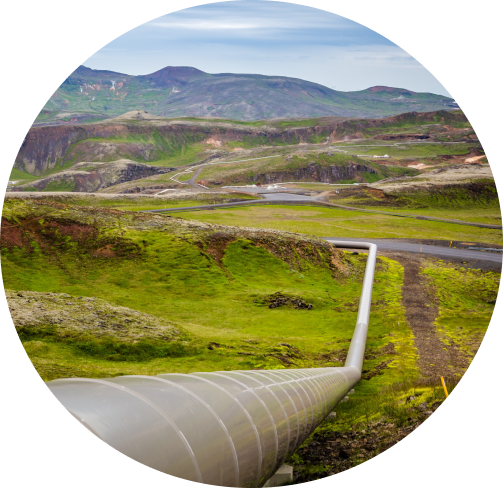Learn All about our parent company
DigiKerma
DigiKerma is the company behind CarbonKerma and the forthcoming KermaExchange. Registered in Herndon, Virginia and founded by energy industry veteran Irfan K Ali, DigiKerma’s aim is to promote a low carbon future through the use of Carbon Capture, Utilization, and Sequestration (CCUS), and other Geological Sequestration solutions, so that the world can meet its Paris Climate Accord goals and continue to enjoy access to affordable and abundant fossil energy.
The company combines the unique characteristics of blockchain technology with the proven potential of CCUS to provide a marketplace of high-quality, fully verified and measured carbon offset credits.
DigiKerma was proud to present at ADIPEC 2023 in Abu Dhabi, introducing our carbon offset credit market to the energy sector at the largest energy conference in the world. We are also proud to have supported Lake Michigan Hills golf club in its decarbonization efforts. The course became the first American golf club, and only the second in the world, to become carbon neutral. We are a proud member of the Global CCS Institute, “an international think tank whose mission is to accelerate the deployment of carbon capture and storage (CCS), a vital technology to tackle climate change and deliver climate neutrality.”
Mission and Values
2015, a course was set to reduce emissions to net zero by 2050, with interim reductions goals set by 2030. Yet, CCUS was not discussed as having any role in those targets.
Since then, both the Intergovernmental Panel on Climate Change (IPCC) and the International Energy Agency (IEA) have acknowledged that the targets set in Paris are not achievable without Carbon Capture playing a significant role.
Our mission is to advance and finance the geological sequestration of CO2 as a carbon abatement measure – the only solution that is viable and scalable. The world needs fossil fuels. Fossil fuels need CCUS. And CCUS needs DigiKerma.
Advancing & Financing CCUS
At DigiKerma, we feel that CCUS would probably have been the best place to start after the Paris targets were established. Given that fossil fuels still provide 80% of our energy, produce 75% of our CO2 emissions, and that CCUS is a decades-old technology, capturing the carbon emissions from existing energy sources and sequestering them underground was an obvious way to reduce emissions at the industrial scale required to meet our shared goals.
Due to ideological and ill-conceived reasoning, that was not done. A focus on renewables stood at the forefront of global decarbonization efforts.
After trillions of dollars in subsidies, renewable energy sources still only provide a small fraction of our total energy needs. Renewables cannot deliver the quantity of energy we need. They cannot be relied upon to deliver baseload power to the grid. The sun doesn’t always shine and the wind doesn’t always blow. And they are not going to be able to deliver the energy needed to the developing world so it has the same chance the Western world has had over the past hundred years to industrialize.
Simply stated, there is no way to switch fossil energy off and replace it with renewables. Our mission is to direct funding to CCUS and allow it to scale so that our economies can decarbonize at the pace required, based on the continued production of energy from fossil fuels, carbon neutrally.

Restoring Confidence in the Voluntary Credit Market
The second problem we seek to address relates to well-documented integrity issues associated with the Voluntary Carbon Market (VCM). We will not meet our Paris Agreement targets unless offsets play a significant role. Companies in energy, transport, and manufacturing in particular will always produce CO2 emissions. It is not avoidable given our current way of life, and it isn’t something to which we should aspire, anyway. For some companies, then, the only path to carbon neutrality necessarily includes offsetting unabatable emissions by purchasing offset credits.
We at DigiKerma have witnessed firsthand companies with high CO2 emissions turn their backs on offsetting because they have lost trust in the offsets they have been buying. This is understandable. The VCM has long been plagued by credits of questionable impact, middlemen taking up to 23x of the funds invested, lax standards, poor accounting, and a blatant lack of transparency and accountability.
We aim to disrupt the broken Voluntary Carbon Market and usher in trusted, measured solutions to reducing atmospheric carbon emissions.
Our marketplace acts as a registry insofar as we perform the same role traditional registries play. The Integrity Council for the Voluntary Credit Market (ICVCM) recommends marketplaces operate or make use of an existing registry to ensure carbon offset integrity. In line with tier recommendations, the CO2 onboarded onto our platform undergoes a rigorous vetting process before it is listed for sale as CKT, tokens that represent each tonne sequestered. The CO2 must have been sunk in compliance with US EPA or ISO standards (the most stringent in the world); the capturer must sign a lengthy legal declaration that the CO2 has not previously been sold as offsets or used for the environmental attributes. We use third party verification to ensure all compliance measures are undertaken.
Promoting Energy Justice and Ending Energy Poverty
The third pillar of our values relates to energy poverty and the role CCUS can play in ending it. Two billion people on Earth live in energy poverty, without any or sufficient access to electricity or fuel. Energy is at the core of the lifestyles we enjoy in the West. It lies at the core of industrial development and all the flow-on effects of that: health outcomes, education outcomes, food security, shelter, social outcomes, and life fulfillment. To live in energy poverty means a lifetime spent finding sources of energy to keep warm, cool, fed, and healthy.
The World Bank has condemned generations of families in developing nations to endless cycles of energy poverty by refusing to fund the development of fossil fuel-based energy production facilities. This stance is based on the false narrative that we can simply switch fossil fuels off and replace them with renewables.
There are no figures that demonstrate that position is even remotely feasible. When countries industrialize, they tend to urbanize. Urbanization requires an enormous amount of energy. And renewables cannot meet those needs.
The fear, unfounded based on the technology and knowhow we have at our disposal, is that if the developing world develops using fossil fuels, as the developed world did, we would not meet our Paris Accord targets. This fundamentally:
- Places the decarbonization burden on those that are least able to afford it and that have made the least contribution to atmospheric CO2;
- Is amoral;
- Ignores the reality that Carbon Capture, a decades-old technology, makes fossil fuel energy production carbon neutral.
DigiKerma’s mission is to help companies with hard-to-abate emissions reduce their net CO2 impact by offsetting through Carbon Capture, Utilization, and Storage (CCUS)-derived offsets and other Geological Sequestration technologies. By doing so, DigiKerma seeks to channel finance to the only scalable, permanent, and – given our continued reliance on fossil fuels – viable decarbonization solution to help the world meet its Paris Accord goals, while continuing to enjoy affordable and abundant energy. Furthermore, DigiKerma recognizes the right of the developing world to industrialize, and the necessary role fossil fuels will play. The company sees CCUS as a crucial technology for the poorer nations to urbanize in a carbon-neutral manner.

Team and Leadership
DigiKerma brings together a team of senior experts in the energy and carbon capture sectors, including Founder and CEO Irfan K Ali, and a strong team of advisors which include former Assistant Secretaries of Energy at the U.S. Department of Energy, pioneers in CCUS in the United States, highly regarded energy and sustainability veterans at international organizations, and the Permanent Representative of Pakistan to the United Nations between 2002-2008.
Added to the senior advisory and executive team, DigiKerma brings together a dynamic combination of highly skilled IT developers, strategic thinkers, financial and fiscal planning expertise, operational & organizational innovators, and a creative team of marketing, communications, business development, and design professionals with years of experience and success.
Our Unique Approach to Achieving Carbon Neutrality
DigiKerma operates a carbon offset marketplace, CarbonKerma (and the forthcoming KermaExchange), where industrial capturers of CO2 can list their sequestered tonnes for sale as offset credits to companies with hard-to-abate emissions. With a commitment to high-quality credits, all CO2 listed must be geologically sequestered under MRV plans and in accordance with EPA regulations in the US, and relevant ISO standards internationally. We have strict safeguards in place in addition to these regulatory requirements to ensure that all tonnes listed on our exchange have not previously been sold or claimed for their environmental attributes.
All transactions that take place on CarbonKerma/KermaExchange, from the listing of sequestered CO2 to the sale, purchase, and retirement of credits, are recorded on the Polygon blockchain. Each tonne of sequestered CO2 is digitized and represented by DigiKerma’s native token, CKT (CarbonKerma token). By leveraging blockchain technology, the risk of double counting is eliminated, and all transactions are recorded immutably on a publicly auditable distributed ledger. The combination of CCUS and blockchain technology gives companies and individuals confidence in the integrity of the offsets and the opportunity to transact in the Voluntary Carbon Market without the business or reputational risk that has rightly become associated with many nature-based carbon credits.
In addition, DigiKerma has developed a patent-pending innovation known as Unique Carbon Tags (UCTs), which are attached to CKT tokens to identify the location and date of the sequestered CO2 represented by the token, and additional details including the wells the CO2 is stored and the meters through which the CO2 was measured. UCT allows auditors easy access to the underlying data.
Future Vision
DigiKerma has already deployed its carbon offset trading marketplace, CarbonKerma, and is soon to launch KermaExchange, which will allow for dynamic CKT trading to ensure liquidity and provide buyers with enhanced options, including buying to hedge or buying to trade, in addition to buying to retire. DigiKerma is currently exploring a number of options in relation to strategic partnerships, technological integrations with partners, and a host of other innovations.
Ultimately, it is DigiKerma’s aim to become the world’s capitalization hub for Carbon Capture, Use, and Storage, providing critical capital for the expansion of CCUS and working alongside partners in the sector to develop and scale up this crucial decarbonization tool.

Contact Information
Feel free to reach out to us at info@digikerma.com for more information or if you have any questions. Make sure you follow us on our social media accounts to keep up-to-date with developments.
Offset your unabatable emissions by creating an account on our marketplace and start or resume your offsetting journey.